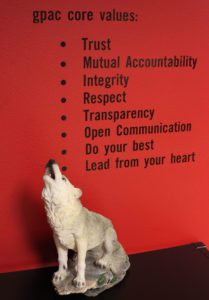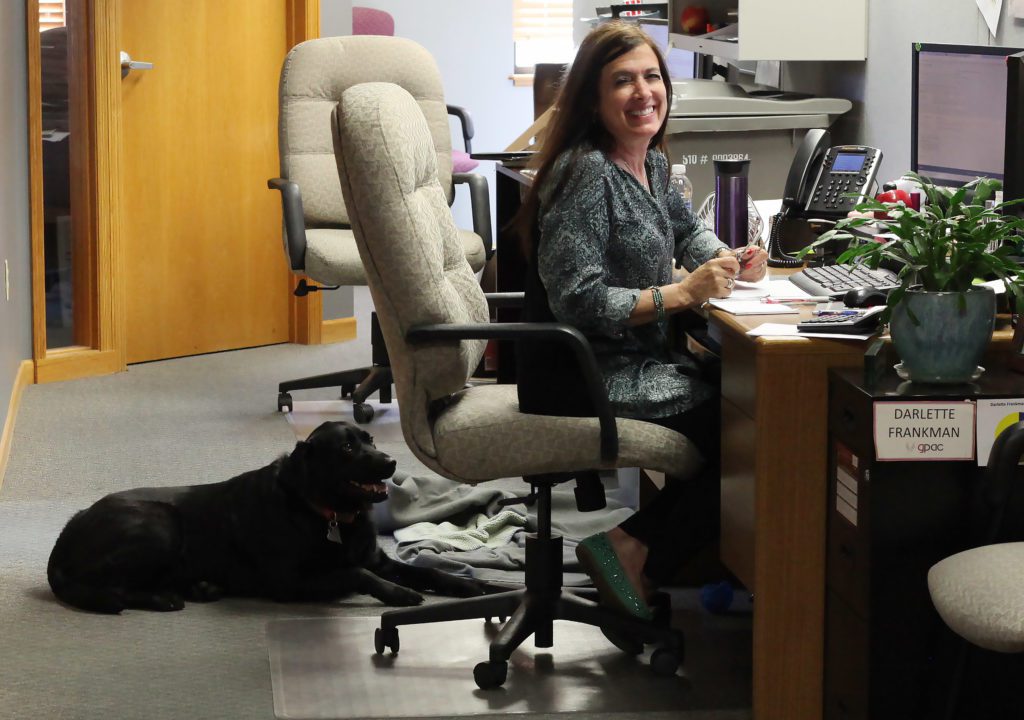Staffing firm gpac aims to become among nation’s largest
By Jodi Schwan
Spend enough time inside the gpac office, and you’re going to hear the sound of a wolf howling.
It likely won’t take long, either.
That’s the sound that comes over the intercom at the south Sioux Falls staffing firm’s office every time a company hires one of gpac’s clients.
“We call it a gpac party. High energy. The music is going. People are having fun and socializing,” said Chad Feldman, the firm’s managing director. “If it’s a party and people are having fun and there’s energy, they’re action-oriented and that leads to results.”

“Right now, in our space on a national level, there’s probably only 15 companies across the country with single-site locations that are bigger than we are, and with our growth plans in the next three to five years … I’ll eat a boot if it’s not the largest site in the country,” said Matt Good, whose father, Dave, got into the staffing industry in 1990.
“The market is blasted with tons of individual kitchen-table small shops, people trying to figure it out on their own. So there’s so much business out there.”

Dave is still involved in the business, and sons Matt and Ryan run day-to-day operations. It has grown to 135 full-time employees spread across three offices in the area of 69th Street and Minnesota Avenue. They work with up to 2,000 companies nationwide at any given time and place 70 to 80 people per month.
“We’re craft first, industry second,” Matt Good said. “We’re really good at finding needs, finding companies, quarterbacking a deal and making things happen. This means that gpac is good at helping companies find the right people to grow with, regardless of the industry they operate in.”
The firm has honed an approach to training that its leaders say is proven to work. New recruiters receive up to a year of on-boarding help, including classroom training to introduce industry basics and the company’s culture. From there, coaches work with them on honing the craft: asking the right questions, qualifying candidates and learning how to source prospects.
“If most people last a year and are dedicated, we’re confident we can get them up to speed, and if they’re doing their part, they’re going to be successful,” Feldman said. “Nobody goes to college to be a recruiter. We have people with master’s degrees and people with no degrees, people who drove Schwan’s trucks, were in medical school and were doing collections.”

“It was intriguing because of the commission structure, to make whatever you want,” said Amy Thomsen, who came to gpac more than two years ago after jobs in sales and collections. “You work harder, and you make more.”

“Everybody roots for each other here,” he said. “This is a career, not a job.”
Thomsen works primarily with clients in the construction industry. She learned the jobs and how the business works and helps clients from Texas, Colorado and Minnesota without leaving Sioux Falls. Gpac staff rarely meet their clients but instead focus on facilitating meetings between applicants and employers.
“It’s not just about the money. You’re truly changing people’s lives,” Thomsen said. “You’re helping people get home to family and relocate or helping people who have been through a big layoff find something. It’s life-changing for people. And it doesn’t feel like work because it’s fun. It’s exciting. There’s music playing throughout the building, and the people you work with become family.”
The work family is growing. The plan is to grow to 300 employees in the next five years. Space in the former McKinneyOlson Insurance building next to Callaway’s, which gpac just acquired, will help. And the firm also owns land in front of Callaway’s it could use for a new building.
The staffing industry nationwide is expected to go from a $144 billion industry to a $240 billion one in the next five to seven years, Good said.
To attract the talent, gpac plans to step up its marketing and visibility to establish its brand further in Sioux Falls.
“We’ll pretty much bend over backward to give somebody the coaching and support they need,” he said, adding he hopes to make Sioux Falls a “recruiter city.”
“How cool is it to create opportunities for people? That’s our whole brand.”
Gpac specializes in finding employees who aren’t actively looking for work but would make a move for the right opportunity, the leaders said. They also find business clients by proactively bringing them “stud candidates,” Good said.
“Just because a company says they aren’t hiring doesn’t mean they aren’t in the business of growing their company and their bottom line,” he said.
While gpac works nationwide across all industries and company sizes, Good said the business prefers working with midsize companies, dealing directly with decision-makers.
“There’s a war for talent,” he added. “In the industries we work in, there’s zero unemployment. There are more jobs than people. They know that. We know that. We’re scrapping every day, and we’re at an advantage because we can take our candidates anywhere and place them.”










